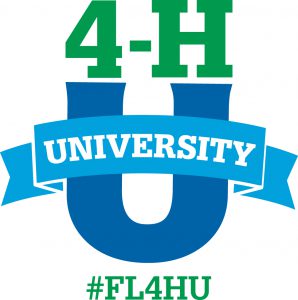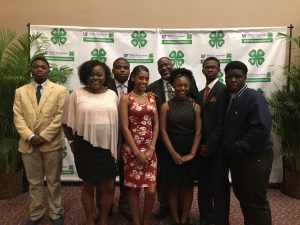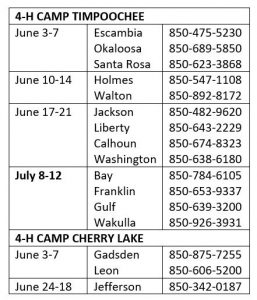by Niki Crawson | May 17, 2019
Have you ever had one of those kids in your life that just towered over you? You know, the kid in your 4-H club, the student in your classroom, or maybe your next door neighbor’s child that just grew every year and made you feel like you were not eating your Wheaties enough. He would be the one that, if you had to have a talk with him, you have to stand on a chair with your tip toes to look eye level, yet he would be just as mild mannered as a teddy bear. He is the youth whose laugh is contagious and his presence fills the entire room. Well, Holmes County 4-H has one of those gentle giants in our midst, Jamin Marks, and I assure you, he is going to be missed in our 4-H family!

Jamin Marks, Holmes County 4-H Member and graduating Senior.
Recently, I went to a local K-8 grade school to recruit new campers for our 4-H Camp Timpoochee summer camping program. While speaking to some students, they initially acted like they might be “too cool” for summer camp. I realized I needed to change my approach of introducing 4-H summer camp to this audience so I stopped mid-sentence into my introduction and simply asked them who knew Jamin Marks, the graduating senior football player from our community. Almost all of the student body raised their hands and I heard quite a few kids throwing out comments such as “he is so cool,” and “Jamin’s my man.” I then asked how many knew that Jamin was a 4-Her and has been to 4-H Camp Timpoochee almost every year since he was 8 years old. Some hands went down, then gasps, and then a rumble started to occur. Finally, I told the group that this was Jamin’s last year at camp and then asked who wanted to sign up for 4-H Camp Timpoochee this year. Every hand in the room shot straight to the ceiling! I knew this was the way to reach my audience because I knew that Jamin has been such a profound impact in the community for many of these younger kids without him even realizing it. That is Jamin, our gentle giant with a giant impact that has made a lasting impression for years to come.

Jamin as a camper in 2014.
Jamin began his 4-H journey by participating in 4-H summer camp at Camp Timpoochee as a camper. Then, in the summer of 2016, Jamin excelled in the role of counselor. He used his gentle gift of humor to ease the fears of new campers, create a sense of belonging, and lighten the mood if tensions were high after a long day of fun and sun. In addition, Jamin began using his leadership skills to help his peers understand the effects of bullying. It did not take long for Jamin to become one of the most requested counselors at summer camp every year. That is our Jamin, our gentle giant, creating a safe environment for every child to feel included.
Jamin believes that being involved in Holmes County 4-H is like being part of a big family and his reference to me as “Mama Niki” tells me where I rate in his circle. His expression of gratitude to all of the 4-H volunteers for their support over the years generates a huge thanks and expressive hug. And, as we conclude the interview for my blog, Jamin can’t help himself. He ends it with, “Mama Niki, you know I am going to become a 4-H volunteer, so I can come back to camp every year and help you with your campers.” I just end the conversation with a huge smile. That is our Jamin, always our gentle giant.
To find out more information about 4-H programs that can offer essential life skills such as independence, organizational skills, and goal setting, to your children or to volunteer with 4-H, please contact your local UF/ IFAS County Extension Office, or follow us on Facebook.
by Yolanda Goode | May 6, 2019

Yes, 4-University is 4 U! 4-H University is one of the premiere state events in Florida 4-H. Teens get the chance to participate in leadership workshops, explore career opportunities, interact with other 4-Hers from across the state, and have fun while learning how to better successfully engage in their community, country, and world. Below you will find useful information as well as why you should attend this flagship state 4-H event.
WHY PARTICIPATE?

2018 Gadsden County 4-H University Delegation
- Fun: We like all things we sign up for to be fun but sometimes they turn out not to be. We assure you, this IS a FUN event.
- Network: Connect with like-minded teens from across Florida.
- Focused learning: Subject matter focused workshops offered are interesting and engaging.
- Explore: Visit an awesome college campus! There are many things to see and do at UF. It is your chance to visit a college campus.
- Dorms: Sleep in a college dorm. Yes, you and your roomies get a little taste of future dorm life.
- Leadership: True leaders know that leadership and learning is an on-going process.
- Service Learning: Giving back to others feels good. Fresh ideas keep us focused and committed.
- Goal Setting: Goals help us to expand our visions. 4-H U helps you set some goals for the future.
- Being Supportive: Fellow attendees are competitors and/or candidates running for State 4-H Officers we want to support.
- Fun: Yes, I mentioned this twice! My Gadsden County 4-H senior youth have enjoyed 4-H U for many years for all the reasons above. They stress FUN twice!
IMPORTANT REGISTRATION INFORMATION
Dates: July 29-August 1, 2019 (multi-day overnight state 4-H event)
Location: University of Florida, Gainesville
Who: Youth who are 4-H age 14-18
Registration: Opens on May 1 and closes June 30 at 11:59 pm Eastern. The cost is $275.00 for full week. Special one-day only registrations are available. Check out the website for more information.
How: Contact your local 4-H office
Learning opportunities: You do not want to be late registering so that you can have a better chance of getting your choice of track workshop: http://florida4h.org/wp-content/uploads/2019/04/4HU_2018_Workshop_Descriptions.pdf
More information: For more information, please visit this http://florida4h.org/programsandevents_/4-h-university/
CALL TO ACTION:
- Contact your local UF/IFAS Extension Office
- Begin the journey as a 4-H Member
- Engage in local programs as well as district and state: http://florida4h.org/programsandevents_/
- Read and share the other great 4-H In The Panhandle blogs by my colleagues
- Follow us on Facebook
by Melanie Taylor | May 1, 2019

Making friends at 4-H Camp in the early 1990’s (Melanie Taylor, Gulf County 4-H Agent, on right)
4-H Summer Camp preparations are in full swing all over the state. As a 4-H agent preparing for our week of county 4-H camp, my days are busy with phone calls and emails from parents, teen counselor training, adult volunteer screenings, paperwork, paperwork and more paperwork. Although it’s busy time for me as a 4-H agent, it also allows me to reflect why I chose this career path and why there is a sense of nostalgia as I prepare for 4-H camp.
Camp Memories
I grew up in Virginia and attended 4-H camp every year from age 9-18. I was a camper that grew into a counselor-in-training and then a full-fledged counselor. Those weeks of 4-H camp were filled with hot days and warm nights, but it was worth it all for the memories I’ll have for a lifetime. I can still smell the cafeteria food and hear the sounds in the gymnasium as kids played basketball and pounded at their leather-craft projects. I still get the chills when I think about our entire camp singing around the campfire circle and patiently waiting for a canoe, filled with camp staff, to land on the lakes edge. The staff would enter the campfire circle carrying the flame and ceremoniously light the fire. I’m still connected with my 4-H camp friends through social media and/or as close friends, and we continue to share our old, blurry camp pictures from the 1990’s each year on Facebook.

Memories to Last a Lifetime…
This is why I work hard to prepare camp for my county campers and teen counselors – I want to create similar memories for them. In 10, 20 or 30 years from now, I want them to think back on the fun moments they experienced in the Florida 4-H camping program. I want them to form friendships and make camp connections for a lifetime, whether it’s learning to kayak, fish, making arts and crafts, cooking over a campfire, singing camp songs and much more.
With all of this said, I hope you as parents will consider giving your child(ren) these special moments. The days are long, but fun, and nights are filled with campfires and hanging out with friends. When they arrive home on Friday, they’ll be exhausted but so excited to share all of the camp songs with you (prepare yourself for lots of loud, enthusiastic singing). They’ll have new friends they want you to meet and tell you camp stories they’ll always cherish.
When is Your County Camping?
In northwest Florida, there are two 4-H Camps:
4-H Camp Timpoochee in Niceville and 4-H Camp Cherry Lake in Madison.
Each county in these camping districts has one week of camp each summer.  Contact your local UF/IFAS Extension Office now
Contact your local UF/IFAS Extension Office now
to find out the details and register your child for a week of fun and memories!
by pmdavis | Apr 10, 2019

Purple Up! on Friday, April 12th
Most people think of the color green when they think of 4-H, but on Friday April 12, 2019, 4-H youth and volunteers in Florida will Purple Up! to show support for our military kids and families. Join us in showing support and celebrate our young heroes! Participation in the 10th annual Purple Up! day is easy – wearing purple and take photos to share on social media using #fl4h and #purpleup.
Why Purple Up?
Military youth have unique challenges. Imagine how you would feel about having long and repeated separations from your parent. Imagine your mom or dad missing important events like birthdays, holidays, and school events. How would you feel about frequent relocation or moves, having to make new friends, get familiar with new schools, and find new 4-H clubs and teams to join? These are all common experiences for military youth!
Many military children take these changes in stride, but it’s also hard to rebuilding a world every time they move. UF/IFAS Extension and 4-H are proud to be a part of the military family – 4-H works with military youth centers across the nation and overseas to create some consistency for youth in these situations.
Why the Color Purple?
Purple symbolizes all branches of the military and is the combination of Army green, Coast Guard blue, Air Force blue, Marine red and Navy blue. By wearing purple and sharing in a visible way, you can show support and thank military children for their strength and sacrifices.
Did You Know?
Florida has the fifth highest number of school-age military children in the country according to the Department of Defense Manpower Data Center. We also have over 50,000 active and reserve military members whose families worry that they are in harm’s way when they deploy.
Be creative….the goal is for military youth to see the support in their school, youth groups, and the community! If you don’t have or own a purple shirt, wear a purple ribbon, tie or headband. Just show your support and let our youth know we care about them! Can’t make the Purple Up! date? Then do something another day in April, the Month of the Military Child!
Remember, take pictures of your group wearing purple and share them on social media using #fl4h and #purpleup.
This allows us to:
- collectively honor military children and their families
- let military kids see the support of their community
- thank military kids for their commitment and sacrifice
For more information on Purple Up!, contact Dr. Paula M. Davis at UF/IFAS Extension Bay County at 850-784-6105.
For more information on 4-H in your county, follow us on Facebook, and contact your local UF/IFAS Extension office.
By Paula Davis, Janet Psikogios and Jennifer Simms
by jgl1 | Mar 29, 2019

Like these Jefferson County volunteers, every 4-H volunteer is making a positive difference in the lives of youth.
As a 4-H Agent, one of the things I am most grateful for is volunteers. Our volunteers are leaders, cheerleaders, mentors, and advocates for our youth. It is with their help and service that many young people find their voice or passion and become healthy, capable, caring, and productive adults.
Volunteers assist by:
- leading club meetings
- serving as camp counselors
- judging speech and demonstration contests
- serving on advisory committees, and
- utilizing their unique interests, skills, and abilities to serve the 4-H program and extend it to audiences which would otherwise be unserved.

Youth volunteers, like our 4-H Camp counselors, are such an asset to the county 4-H program.
In the process, our volunteers shape future leaders by demonstrating leadership skills, instilling a sense of community, and offering a positive connection with someone from a different age group or generation. And while they do not serve for praise or recognition, many volunteers get a great deal of fulfillment, self-satisfaction, and enjoyment in volunteer service, as they watch youth develop self-confidence, self-worth, and leadership skills
Whether they serve episodically or for many years, volunteers are a valuable and essential component of 4-H. Without their help, 4-H could not deliver the excellent programs that are the cornerstone of Extension.
To all of the volunteers in the district, thank you for all you do.
Learn more about volunteering with Florida 4-H or contact your local UF/IFAS Extension to learn about 4-H in your county and discuss your possibilities with your 4-H Agent.
We’ll be highlighting more about 4-H volunteers during the month of April, so be on the lookout for some great stories!
by Marie Arick | Mar 28, 2019

Tropicana Speech Contest
Liberty County 4-H’s Annual 4-H/Tropicana Public Speaking Contest included a special guest speaker with a uniquely delivered speech!
Ms. Delmy Pineda, a sixth grader at W.R. Tolar School, suffers from Cerebral Palsy. Delmy shared with her therapist, Kara Bradley, her desire to participate in the Tropicana Speech Contest. Delmy knew this was her last chance to participate being a sixth grader, so together, the two set out to make this happen.
So why is this so different? Delmy’s primary vehicle of communication is via a speech assist device. Yes, a computer-generated voice provided through a computer program. A first for any competitor.
Delmy wrote her speech, “Who Runs the World”, presented it and won in her class! Although she did not win in her school competition, Delmy embraced the opportunity and really championed the spirit of the competition. With that spirit in mind, the school administration asked if she could present at the County Competition as an honorary speaker. Of course, Delmy was added to the program without hesitation. Delmy presented her speech utilizing her speech assist device, a first for the Tropicana Competition. Delmy received a standing ovation. At that moment, Delmy was running the world.
For more information about the 4-H/Tropicana Public Speaking Program, or any other opportunities for your child, please contact your local UF IFAS Extension Office.











